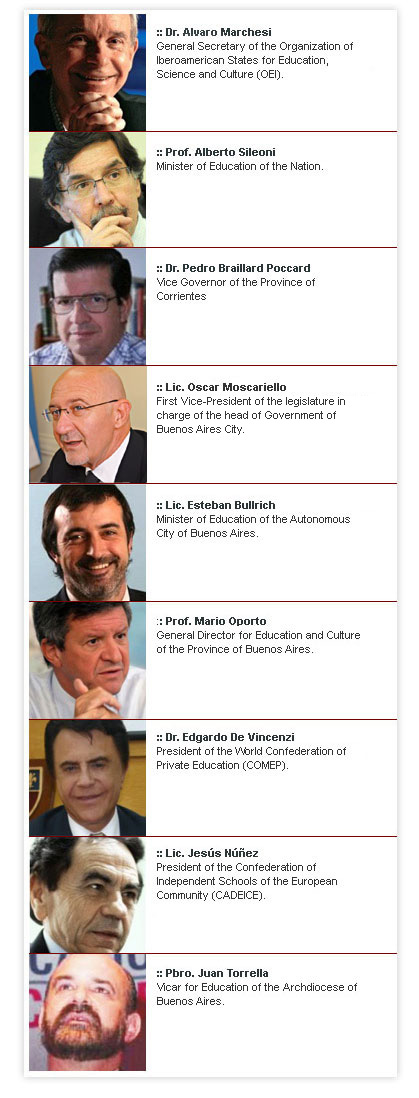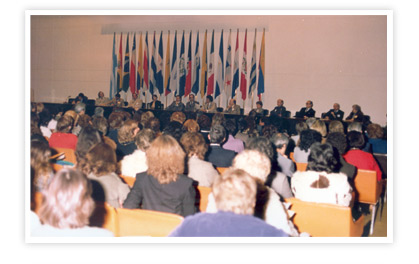| World Confederation of Education - COMED |
| Buenos Aires, Argentine - 2010 |
CONGRESS ABSTRACT
IBEROAMERICAN CONGRESS ON EDUCATION (2010)
Golden Hall of the Legislature Porteña
IBEROAMERICAN EDUCATION CONGRESS
The recurrent educational reforms launched in the last decades constituted spaces of confluence of these general policies and specific actions. But it is necessary to review their results. A quick review shows that the results were poor in terms of inclusion and quality education. The high degree of trade conflict also shows that new strategies should be drawn from consensus among all stakeholders so that the educational systems of Latin America regain the prestige they exhibited when they earned their institutionalization.
Therefore the World Confederation of Private Education, together with its member organizations (CADEICE - Confederation of Independent Schools of European Community-and-FAEPLA Federation of Private Education in Latin America and the Caribbean) offer this ample space for reflection and exchange after two centuries of the emergence of national communities in Latin America.
TOPICS
- TWO CENTURIES OF EDUCATION IN THE NATIONS OF IBEROAMERICA: REALITIES, UTOPIES AND HOPE.
- EDUCATION IN VALUES TO INSTITUTE SUSTAINABLE POLICIES IN THE AREA OF HUMAN RIGHTS AND INTERCULTURAL COEXISTANCE.
- TENDENCIES AND CHALLENGES IN THE CONSTURCTION OF AN IBEROAMERICAN IDENTITY.
- PUBLIC POLICIES IN EDUCATION TO GUARANTEE INCLUSION WITH QUALITY.
- THE COOPERATION BETWEEN STATES AND PRIVATE INITIATIVE TO IMPROVE EDUCATIONAL MANAGEMENT AND FINANCING.
- EDUCATIONAL GOALS FOR 2021 IBEROAMERICA.
GUEST SPEAKERS AMONG OTHERS:

Buenos Aires, April 30th 2010
DECLARATION OF BUENOS AIRES

In the Autonomous City of Buenos Aires, on the occasion of the beginning of the commemoration of the 200 years of the birth of Hispanic American nations, we, representatives of the privately run public education in Latin America, meet in order to reaffirm and update the ideals that gave rise to the World Confederation of Education (COMED).
Since its founding in this city in 1990, COMED has been firmly developing exhortations to defend the right of all people to freely choose a quality education that responds to their convictions, as an essential condition to ensure their realization and its communities.
In these more than 20 years our nations went through different experiences of reform in education systems. There have been many achievements but there still remain many debts.
The universal demand for more and better education for everyone today is an imperative that challenges us and demands our extreme creativity and imagination to ensure this right to our children, our young and even our adults. Its absence leads to unemployment, poverty and various forms of social marginalization much widespread in our continent. The continuous scientific and technological developments in turn demand new and more advanced skills from those who succeed in graduating from the educational system, which as a consequence requires constant review of the curricula and the structures of the system.
In order to make this happen within a framework of rationality and respect for the fundamental rights of any person, the sector of society we represent is bound to play an irreplaceable role by virtue of its rich and extended experience gained in the course of our history. Social and private initiative education has preceded and accompanied the constitution of those national states showing commitment and dedication to service since the Europeans arrived in this land. They also promoted the strengthening of young nations by providing instruction when newly born states had yet to structure their educational systems, collaborating with schooling in those areas the State could not reach, even if they still had presence for they lacked universal covering of educational resources.
Along this line we understand that the 2021 Educational Goals proposed by the General Secretary of OEI, Dr Alvaro Marchesi -who honored us with his presence in this Congress- constitute an irreplaceable tool to attend to the “... pressing social demands such as engaging more students to study for a longer time, with an offer of renowned quality, equitable and inclusive, and with the inclusion of the great majority of institutions and sectors of society” This and other equally transcendent objectives also constitute a commitment to our Confederation, which feels truly honored and motivated to accompany the OEI through the International Advisory Board, which we were invited to join by its General Secretary.
During the last 20 years new laws have been passed as attempts to improve the educational situation of our countries. The verified results -save honourable exceptions- tell us that in our countries children are learning less and less; or at least that what they are learning does not represent socially valid skills to thrive in their communities. The change in the social paradigm brought by the inclusion of Information and Communication Technologies in social and economic developments requires the revision of teaching models and contents, as well as of those permanent practices that threaten the continuity of work in schools. As a consequence, this all turns the situation into a vicious circle in which, those who protest to ask for better conditions end up contributing to the appearance of greater injustices: they make the learning conditions of the poor worse for they have fewer classes and under inadequate conditions.
We are convinced that injustices and deficient learning can be overcome with more education and of better quality. This shall be possible with the effort of all: the State, social initiative, parents, teachers, civil servants, children, young people and adults, each one in the exercise of their own responsibility and up to the extent of their own possibilities, cooperating with the least fortunate. As it was stated by the Ministers of Education in the XVIII Iberoamerican Conference of Education, this requires “the necessary social participation and commitment of those countries with greater resources to contribute to the accomplishment of the goals of the countries with less means.
The sectoral bid for state budgets should be answered with efficient and productive criteria so that the funds reach those who need them the most. The system of state funding of private education has proven to be rational enough in those countries that apply it, allowing them to ensure their subjects the access to education of quality. This compelling fact demands brave responses devoid of ideological conditioning so as to move forward in the implementation of universal education systems in those places it still has not been done.
Unfortunately, anachronistic questionings of the essence of private educational service can again be heard in our continent. Therefore we reiterate our unconditional solidarity to educational institutions and the entities that legitimately represent them so that they may continue developing their actions without any kind of conditioning, pressure or interference. The educational processes are mucho too complex and require an atmosphere of freedom to consolidate, improve and transform reality.
In line with all documents and international consensus concerning education, the proposition “More and better education for everyone” is still the premise that inspires us to improve the quality of life of our people. The rich experience of joint effort and articulation between subjects and state should be the example to follow; it is this mixed model supported nowadays by the majority of Western countries that has structured a solid educational system during the second half of the XX century, with different suppliers but with a same purpose. Surpassing the past and moving towards a future in which these goals can be accomplished shall depend, to a large extent, on our capacity for dialogue and imagination.
The commemoration of the Bicentennials of Independence of the Latin American Republics is a great opportunity to go back to work for the collective dreams, those that moulded the different generations: that of the emergence of our nationalities, that of our grandparents who arrived during different waves of immigration, that of our parents who started to see a promising future and finally ours, for we continue nurturing the possibility of materializing the utopia that only education can help become true.
AUTHORITIES PRESENT
• Alvaro Marchesi
• Edgardo De Vincenzi
• Jesús Núñez
• Pbro. Juan Torrella
• Mariano Narodowski
